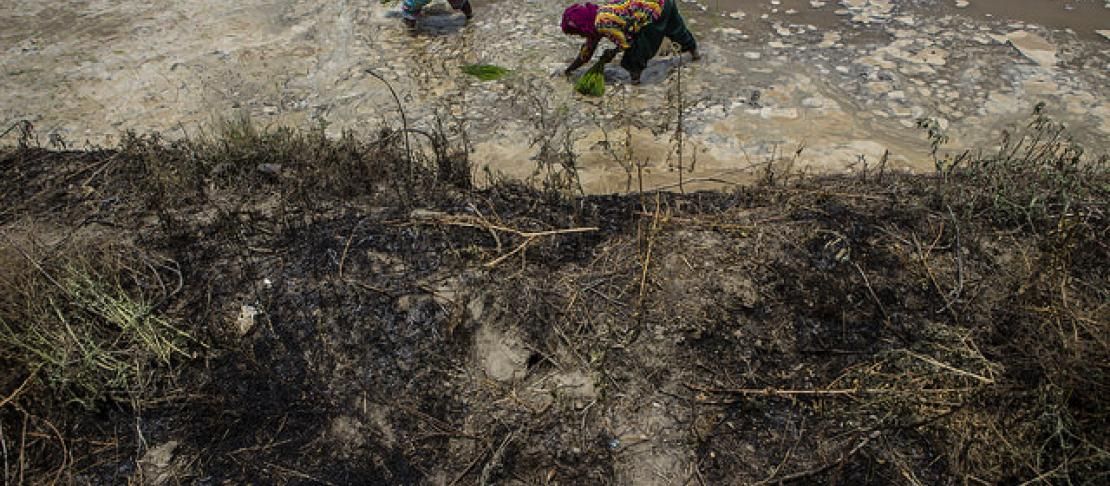Remote sensing innovations for index-based flood insurance in South Asia

Project description
Growing population, along with poor management of land and water resources and increased risk of extreme climatic events, leave a large number of people vulnerable to floods. A report by The United Nations Office for Disaster Risk Reduction (UNISDR) in 2011 estimated that 800 million people live in flood-prone areas, with 70 million experiencing yearly floods. Floods can severely impact infrastructure, agriculture and ecosystems, as well means of livelihoods and public health. Agricultural communities, especially smallholder farmers, are subjected to severe economic pressure from flood-induced losses.
Traditionally, flood-risk management has focused on infrastructure, such as building dams and flood walls, or rebuilding activities and compensation after the event—particularly in the case of agriculture. However, over the last few decades, evidence has emerged that a broader approach through planning, building regulation, and early warning systems can significantly reduce flood losses. Index-based flood insurance (IBFI) is one such solution that is cost-effective and can better target post-disaster relief to compensate agricultural losses.
Index-based flood insurance (IBFI) is an innovative approach to developing effective payout schemes for low-income, flood-prone communities. This project aims to integrate hi-tech modelling and satellite imagery with other data to predetermine flood thresholds—which could trigger speedy compensation payouts. Effective end-to-end solutions will be developed in collaboration with a range of organizations and experts from central and state government bodies, private insurance firms, community-based organizations (CBOs), and nongovernmental organizations (NGOs). The project aims to contribute to sustainable approaches to index-based flood insurance that can help smallholders better manage their production risks.
This project will help bring together different partners, including CGIAR centers, government, and the insurance industry to pilot IBFI to enhance agriculture resilience and flood proofing livelihoods. IBFI will be implemented in 2017 by different partners, which are becoming learning platforms for climate-safety nets interventions in agriculture and risk management solutions.
The project covers select districts in India and Bangladesh, making it the first attempt to develop IBFI at a large scale in these countries.
Outcomes
The meso-level flood index insurance will be designed to protect low income, vulnerable flood prone communities by improving their ability to cope with flood risks, which would contribute to their socio-economic development. The project will help to generate at least two initiatives to be implemented jointly by insurance industries and national/state governments in South Asia. Each initiative will benefit at least 50,000 to one million farmers. The innovative flood insurance products for South Asia will be implemented in close cooperation with various actors (government, insurance companies, international NGOs, CBOs, NGOs) in a public-private partnership to promote adaptation practice to climate change, and develop a policy oriented model in scale up process. The project will also aim to support integration of the insurance into climate change adaptation strategies in both countries.
Outputs
- Scoping report on IBFI preferences of insurance products among local communities and financial feasibility studies for product sustainability
- Testing and evaluation of IBFI in a select districts in collaboration with governments, private insurance companies and other key stakeholders
- Video: Index Based Flood Insurance: A more secure future for India’s farmers
- Book chapter: Amarnath, Giriraj; Islam, A. K. M. S.; Shrestha, M. S. 2016. Managing variability: floods and droughts. In Bharati, Luna; Sharma, Bharat R.; Smakhtin, Vladimir (Eds.). The Ganges River Basin: status and challenges in water, environment and livelihoods. Oxon, UK: Routledge - Earthscan. pp.71-92.
- Website: Index-based Flood Insurance (IBFI): Increasing agricultural resilience and flood-proofing livelihoods
- Report: Mapping multiple climate-related hazards in South Asia
- Technical brief: Reducing vulnerability among smallholder farmers through index-based flood insurance in India: Equity matters
Other expected outputs include:
- Institutional framework and financial mechanism for scaling up/out of IBFI developed.
- 2 initiatives in India and Bangladesh implemented jointly by insurance industries and national/state governments.
- Economic analysis of flood insurance product in South Asia
News & updates:
- Blog: Flood insurance in the climate change era: Can science and tech help women get a better deal?
- Blog: Getting a handle on drought surveillance
- Blog: Maps that matter when flooding strikes
- News: India's water-logged farmers try out revamped flood insurance
Gender
The project is looking the issues around index insurance and equity (including gender) which includes whether women have as much access to index insurance as men, and overall women’s adaptive capacity is monitored throughout project implementation.
Partners
The project is led by the International Water Management Institute (IWMI), in collaboration with the International Food Policy Research Institute (IFPRI), the Agriculture Insurance Company of India Limited (AIC), Swiss Reinsurance Company Ltd, the Institute of Water Modeling (IWM), Government of Bihar-India and the Indian Council of Agricultural Research (ICAR).
Further information
For more infomation, please contact project leader Giriraj Amarnath (IWMI) at a.giriraj@cgiar.org